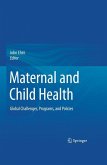The improvement of maternal and child health in developing countries is one of the major axes on which health actors and governmental decision-making authorities rely to ensure the good health and well-being of populations. The achievement of this objective is conditioned by a quality health care offer (vaccination, intermittent preventive treatment, prevention of mother-to-child transmission, etc.) at all levels of the health pyramid. The quality of health services offered to the population depends enormously on the way the health system is financed: health personnel who are not sufficiently remunerated are de-motivated and are likely to produce poor performance. Performance-based financing is an approach that aims to motivate operational health workers based on their results. Examining and evaluating the positives of this new approach with a focus on maternal and child health indicators is necessary to help local health authorities make good decisions.
Bitte wählen Sie Ihr Anliegen aus.
Rechnungen
Retourenschein anfordern
Bestellstatus
Storno








